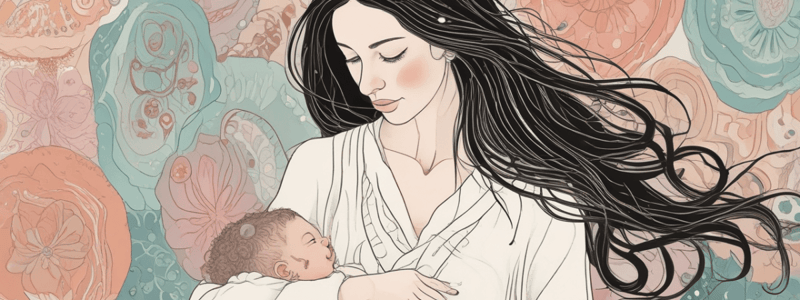Podcast
Questions and Answers
What is the duration of moderate pain after vaginal delivery?
What is the duration of moderate pain after vaginal delivery?
- 2 days (correct)
- 1 day
- 4 days
- 3 days
Which type of lochia has a yellow color?
Which type of lochia has a yellow color?
- Lochia cruenta
- Lochia rubra
- Lochia serosa
- Lochia alba (correct)
What is the primary cause of afterpain in multiparas?
What is the primary cause of afterpain in multiparas?
- Prolactin hormone release
- Oxytocin release during breastfeeding
- Uterine contractions at interval (correct)
- Tonic uterine contractions
What percentage of women still have lochia at week 6 postpartum?
What percentage of women still have lochia at week 6 postpartum?
What is the primary reason for the absence of ovulation immediately postpartum?
What is the primary reason for the absence of ovulation immediately postpartum?
What is the characteristic of lochia serosa?
What is the characteristic of lochia serosa?
What is the primary cause of afterpain in primiparas?
What is the primary cause of afterpain in primiparas?
What is the duration of lochia in most women?
What is the duration of lochia in most women?
What is the effect of breastfeeding on the uterus?
What is the effect of breastfeeding on the uterus?
What is the characteristic of lochia rubra?
What is the characteristic of lochia rubra?
What is the approximate weight of the uterus immediately after delivery?
What is the approximate weight of the uterus immediately after delivery?
By what time has the uterus usually returned to the true pelvis?
By what time has the uterus usually returned to the true pelvis?
What is the characteristic of the external os after childbirth?
What is the characteristic of the external os after childbirth?
By what time has the vaginal epithelium returned to a normal non-pregnant state?
By what time has the vaginal epithelium returned to a normal non-pregnant state?
What is the characteristic of the perineum by 1-2 weeks postpartum?
What is the characteristic of the perineum by 1-2 weeks postpartum?
What is the approximate time frame for the uterus to return to a non-pregnant state?
What is the approximate time frame for the uterus to return to a non-pregnant state?
What is the characteristic of the cervix after childbirth?
What is the characteristic of the cervix after childbirth?
What is the characteristic of the vagina after childbirth?
What is the characteristic of the vagina after childbirth?
By what time has the increased vascularity and edema of the vagina resolved?
By what time has the increased vascularity and edema of the vagina resolved?
What is the definition of the puerperium period?
What is the definition of the puerperium period?
What percentage of gestational weight gain is typically lost in the first six weeks after delivery?
What percentage of gestational weight gain is typically lost in the first six weeks after delivery?
What is the primary factor in determining when a woman can return to her pre-pregnant abdominal wall state?
What is the primary factor in determining when a woman can return to her pre-pregnant abdominal wall state?
What is the typical time frame for physical readiness to resume sexual intercourse after delivery?
What is the typical time frame for physical readiness to resume sexual intercourse after delivery?
What is the primary benefit of pelvic floor rehabilitation during the postpartum period?
What is the primary benefit of pelvic floor rehabilitation during the postpartum period?
What is the recommended duration of moderate-intensity exercise per day during the postpartum period?
What is the recommended duration of moderate-intensity exercise per day during the postpartum period?
What is the primary role of a women's health physiotherapist during the postnatal period?
What is the primary role of a women's health physiotherapist during the postnatal period?
What is the primary benefit of postnatal exercise in terms of mental health?
What is the primary benefit of postnatal exercise in terms of mental health?
What is the primary outcome of incorporating physical therapy into postpartum care?
What is the primary outcome of incorporating physical therapy into postpartum care?
What is the primary purpose of manual therapies in postpartum care?
What is the primary purpose of manual therapies in postpartum care?
What is the primary benefit of postnatal exercise in terms of lactation?
What is the primary benefit of postnatal exercise in terms of lactation?
What percentage of women who are not breastfeeding return to their periods within 36 weeks?
What percentage of women who are not breastfeeding return to their periods within 36 weeks?
What is the primary reason for feeding the baby every 2-3 hours to stimulate milk production?
What is the primary reason for feeding the baby every 2-3 hours to stimulate milk production?
What is the approximate weight loss during the puerperium due to contraction of the uterus, loss of lochial fluid, and loss of excess fluids?
What is the approximate weight loss during the puerperium due to contraction of the uterus, loss of lochial fluid, and loss of excess fluids?
What is the primary reason for initiating breastfeeding as soon as possible after delivery?
What is the primary reason for initiating breastfeeding as soon as possible after delivery?
What is the contraindication for breastfeeding in women with active herpes simplex virus?
What is the contraindication for breastfeeding in women with active herpes simplex virus?
What is the primary function of colostrum in the first 2-4 days after delivery?
What is the primary function of colostrum in the first 2-4 days after delivery?
What is the mean weight loss from the delivery of the fetus, placenta, and amniotic fluid?
What is the mean weight loss from the delivery of the fetus, placenta, and amniotic fluid?
Why is lactation possible as early as 16 weeks' gestation?
Why is lactation possible as early as 16 weeks' gestation?
What is the primary reason breastfeeding is not automatic or easy?
What is the primary reason breastfeeding is not automatic or easy?
What is the primary contraindication for breastfeeding in women with HIV?
What is the primary contraindication for breastfeeding in women with HIV?
Flashcards are hidden until you start studying
Study Notes
Normal Puerperium
- Definition: The time from the delivery of the placenta through the first few weeks after delivery (6 weeks postpartum)
- Importance: By 6 weeks after delivery, most of the changes of pregnancy, labor, and delivery have resolved and the body has reverted to the non-pregnant state
Uterus
- Size: Immediately after delivery, the uterus can be palpated at or near the umbilicus, reducing to 500g after 1 week, 300g at the end of 2 weeks, and 100g or less thereafter
- Weight: Most of the reduction in size and weight occurs in the first 2 weeks
- Tissues revert to a non-pregnant state, but never return to the nulliparous state
Cervix
- The external os is closed to the extent that a finger could not be easily introduced
- The external os never resumes its pre-gravid shape; it becomes a large, transverse, stellate slit after childbirth
Vagina
- Shrinks to a non-pregnant state
- Resolution of the increased vascularity and edema occurs by 3 weeks
- The vaginal epithelium appears atrophic on smear, restored by weeks 6-10
- Tissues revert to a non-pregnant state, but never return to the nulliparous state
Perineum
- Swelling and engorgement are completely gone within 1-2 weeks
- The gapping of the vulva that occurs during vaginal delivery remains for 2-3 weeks, then gradually disappears, but never returns to the pre-pregnancy state
- Muscle tone may or may not return to normal, depending on the extent of injury
Afterpain
- Duration: Moderate pain for 2 days, mild pain by the 3rd day postpartum
- Causes:
- Multipara: The uterus contracts vigorously at intervals
- Primiparas: The uterus tonically contracts
- Infant suckling (breastfeeding): Oxytocin release → uterine contraction → afterpain
Lochia
- Duration: Variable, lasts about 5 weeks, with 15% of women having lochia at week 6 postpartum
- Types:
- Lochia rubra: Red, variable duration
- Lochia serosa: Brownish-red, more watery consistency, decreases in amount
- Lochia alba: Yellow
Ovulation and Menstruation
- There is no ovulation immediately postpartum due to prolactin hormone inhibiting gonadotrophin releasing hormone (GnRH) release from the hypothalamus
- Ovulation is restored after a duration depending on whether the woman is breastfeeding or not
- Menstrual cycles resume when ovulation is restored
Breastfeeding
- Changes to the breast that prepare for breastfeeding occur throughout pregnancy
- Lactation can occur by 16 weeks' gestation
- Colostrum: High in protein and immune factors, first 2-4 days after delivery
- Mature milk: Contains all the necessary nutrients, changes throughout the period of breastfeeding
- Initiation: Should be initiated as soon as possible after delivery, feeding every 2-3 hours to stimulate milk production
Contraindications to Breastfeeding
- Alcohol use and street drugs
- Certain medications
- Active untreated tuberculosis (TB)
- Infections: HIV, Cytomegalovirus, and hepatitis B virus
- Women with active herpes simplex virus
- An infant with galactosemia
- Mother undergoing breast cancer treatment
Physiologic Weight Loss
- Mean weight loss from delivery of the fetus, placenta, and amniotic fluid is 6 kg
- Additional loss of 2 to 7 kg during the puerperium due to contraction of the uterus, loss of lochial fluid, and loss of excess intra- and extracellular fluid
- Approximately one-half of gestational weight gain is lost in the first six weeks after delivery, with a slower rate of loss through the first six months postpartum
Abdominal Wall
- Remains soft with poor tone for many weeks
- Return to a pre-pregnant state depends greatly on exercise
Sexual Intercourse
- May resume when:
- Red bleeding ceases
- Vagina and vulva are healed
- Physically comfortable
- Emotionally ready
- Physical readiness usually takes ~3 weeks
Concerns - Puerperal Period
- Physical activity and exercise during the postpartum period
- Pelvic floor rehabilitation:
- Prevent and manage pelvic organ prolapse
- Prevent and manage urinary incontinence
- Improve sexual function
- Benefits of postnatal exercise:
- Restores physical health
- Improves sleep quality
- Relieves stress
- Prevention of depressive disorders
- Reduced body weight
- Stimulates lactation
- Alleviates postnatal issues such as diastasis recti, urinary incontinence, pelvic organ prolapse, and pelvic girdle pain
Role of Women's Health Physiotherapist
- Physical therapy can improve health outcomes for new mothers in the postnatal period
- Benefits:
- Improve mood
- Improve cardio-respiratory fitness
- Promote weight loss
- Reduce the risk of postpartum depression and anxiety
- Enhance psychological well-being
- Improve sexual health and sexual dysfunction
- Lead to better outcomes assessing quality of life
Studying That Suits You
Use AI to generate personalized quizzes and flashcards to suit your learning preferences.




